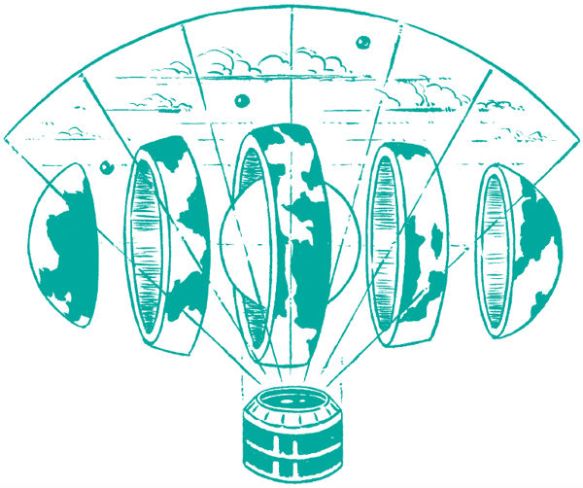 The dazzling Haus der Kulturen der Welt in Berlin (left) has posted a series of videos from its January 2013 series, The Anthropocene Project, here. The list includes a series of dialogues/conversations (including Michael Taussig) and four keynotes:
The dazzling Haus der Kulturen der Welt in Berlin (left) has posted a series of videos from its January 2013 series, The Anthropocene Project, here. The list includes a series of dialogues/conversations (including Michael Taussig) and four keynotes:
Will Steffen, The Anthropocene: where are we going?
As one of the major proponents of the Anthropocene hypothesis, Will Steffen explores in his talk the origins of and scientific basis for the Anthropocene. From humanity’s hunter-gatherer beginnings to the previous century’s post-war global acceleration of populations, technologies, and consumption habits, the main question this lecture addresses is: where is all of this leading? Is the Great Acceleration the “new normal,” or will the earth system force the Anthropocenic era into a different direction? Steffen proposes an evaluation of the planetary future’s possibilities, asking: are we on the road to global sustainability or are we poised for global collapse?
Dipesh Chakrabarty, History on an expanded canvas: the Anthropocene’s invitation
If climate scientists have become social historians, how can one translate their findings and construct an aggregate, common narrative that is not only legible to both localized sociologies and planetary geophysics, but effectively integrates both these positions? Post-colonial theorist and historian Dipesh Chakrabarty reflects on potentialities of past and future narratives within the Anthropocene. What kinds of empowerment and disempowerment do these collaborative and multifaceted storytellings imply for the Anthropocene? Chakrabarty engages with the proposed necessity of associating the histories of the earth and that of humans in order to effectively open up intellectual pathways towards the dissolution of modernity’s misunderstandings concerning human agency and capitalistic freedom.
Elizabeth Povinelli, Geontologies: a requiem to late liberalism
Much critical theory has attempted to think life out-sideof the “human,” yet most applications of the Anthropocene have focused on how humanity might find a way to keep its way of life without loosing the “human.” Is the Anthropocene, then, a framework for humanizing or environmentalizing capitalism without losing capitalism? Departing from the premise that Western political theory is rooted in the carbon cycle, where life is seen as a metabolic ring of growth, reproduction, and degeneration, Povinelli tackles the “carbon imaginary” of biopolitics. She considers the diverse local arrangements of “life” in relation to the technological procedures of maintenance and renewal. What forms of being are privileged to lay claim to life or to preserve the earth’s being-processes?
John Tresch, Cosmograms, or how to do things with worlds
Each culture has had means to conceptualize and address the nature and composition of the universe, frequently creating representations of the order of all that exists, also known as “cosmograms.” The concept of a cosmogram can be expanded to apply to all knowledge about “natural” and “human” worlds, as well as the interactions between them. Departing from the Anthropocene thesis’ conception of nature as a malleable entity, historian John Tresch takes a culturally and historically comparative perspective to consider instances of cosmo-pragmatics, or how cosmograms have been used to foster intervention upon the world. His talk addresses a variety of exemplary phenomena, from 19th century Romanticism and the Industrial Revolution to today’s ecological discourse and the fragility of our cosmic order.
I hope there’s more to come, since the programme – a detailed pdf with abstracts is here – also included a performance by Taussig, a lecture from Rem Koolhaas, and contributions from Lorraine Daston, John Law, Paolo Tavares, Eyal Weizman, Cary Wolfe and a host of others. I very much like the idea of bringing the visual and performing arts into the discussion and transcending the conventional dull boundaries of the humanities and (especially) the ‘natural’ and ‘social’ sciences (to see something of what I mean, go here and scroll down to the image of John Law and Xavier Le Roy…)
Illustration: (c) Benedikt Rugar 2012
“The Anthropocene Project” is an initiative of Haus der Kulturen der Welt in cooperation with the Max-Planck-Gesellschaft, Deutsches Museum, the Rachel Carson Center for Environment and Society, Munich and the Institute for Advanced Sustainability Studies, Potsdam. It’s a two-year project advertised thus:
Our notion of nature is now out of date. Humanity forms nature. This is the core premise of the Anthropocene thesis, announcing a paradigm shift in the natural sciences as well as providing new models for culture, politics, and everyday life. In a two-year project, HKW will explore the hypothesis’ manifold implications for the sciences and arts. The “Anthropocene” is the new geological “age of mankind” as proposed by the Earth sciences. Popularized by Nobel Prize winner Paul J. Crutzen around the turn of the millenium, the term now stands for one of the most trailblazing scientific concepts of the present. The transdisciplinary Anthropocene Project explores this concept, using research and presentation methods from the arts and sciences. If the opposition between humanity and nature is now suspended, how do we change our perspectives and perception? Is it still possible to think in concepts like “artificial” and “natural?” What does it mean for our anthropocentric understanding and our future if nature is man-made? What impact does the notion of global changes has on political decision-making? Which image of humanity appears if nature is shaped by mankind?
Good questions, though – since I’m still in thrall to Nigel Clark‘s Inhuman nature – I’m not so sure about the anthropocentric weight in this paragraph and, perhaps, more generally; it’s Nigel’s work that, in part, drives my interest in ‘nature’ as a medium through which (rather than merely ‘over which’) war is conducted.

